Java集合介绍【英文】
JAVA英文单词-必会

Java基础常见英语词汇(共70个)Author:JCCOO: object-oriented ,面向对象OOP: object-oriented programming,面向对象编程JDK:Java development kit, java开发工具包JVM:java virtual machine ,java虚拟机Compile:编绎Run:运行Class:类Object:对象System:系统out:输出print:打印line:行variable:变量type:类型operation:操作,运算a rray:数组parameter:参数method:方法function:函数member-variable:成员变量member-function:成员函数get:得到set:设置public:公有的private:私有的protected:受保护的default:默认access:访问package:包import:导入static:静态的void:无(返回类型)extends:继承 parent class:父类base class:基类super class:超类child class:子类derived class:派生类override:重写,覆盖overload:重载final:最终的,不能改变的abstract:抽象interface:接口implements:实现exception:异常Runtime:运行时ArithmeticException:算术异常ArrayIndexOutOfBoundsException:数组下标越界异常NullPointerException:空引用异常ClassNotFoundException:类没有发现异常NumberFormatException:数字格式异常(字符串不能转化为数字)Try:尝试Catch:捕捉Finally:最后Throw:抛出Throws: (投掷)表示强制异常处理Throwable:(可抛出的)表示所有异常类的祖先类Lang:language,语言Util:工具Display:显示 Random:随机Collection:集合ArrayList:(数组列表)表示动态数组HashMap: 散列表,哈希表Swing:轻巧的Awt:abstract window toolkit:抽象窗口工具包Frame:窗体Size:尺寸Title:标题Add:添加Panel:面板Layout:布局Scroll:滚动Vertical:垂直Horizonatal:水平Label:标签TextField:文本框TextArea:文本域Button:按钮Checkbox:复选框Radiobutton:单选按钮Combobox:复选框Event:事件Mouse:鼠标Key:键Focus:焦点Listener:监听Border:边界Flow:流Grid:网格MenuBar:菜单栏Menu:菜单MenuItem:菜单项PopupMenu:弹出菜单Dialog:对话框Message:消息Icon:图标Tree:树Node:节点Jdbc:java database connectivity,java数据库连接DriverManager:驱动管理器Connection:连接Statement:表示执行对象Preparedstatement:表示预执行对象Resultset:结果集Next:下一个Close:关闭executeQuery:执行查询Jbuilder中常用英文(共33个)File:文件New:新建New Project:新建项目New Class: 新建类New File:新建文件Open project:打开项目Open file:打开文件Reopen:重新打开Close projects:关闭项目Close all except…:除了..全部关闭Rename:重命名Exit:退出View:视图Panes:面板组Project:项目Content:内容 Structure:结构Message:消息Source:源文件Bean:豆子Properties:属性Make:编绎Build:编绎Rebuild:重编绎Refresh:刷新Project properties:项目属性Default project properties:默认的项目属性Run:运行Debug:调试Tools:工具Preferences:参数配置Configure:配置Libraries:库JSP中常用英文URL: Universal Resource Location:统一资源定位符IE: Internet Explorer 因特网浏览器JSP:java server page.java服务器页面Model:模型View:视图C:controller:控制器Tomcat:一种jsp的web服务器WebModule:web模块Servlet:小服务程序Request:请求Response:响应Init: initialize,初始化Service:服务Destroy:销毁Startup:启动Mapping:映射pattern:模式Getparameter:获取参数Session:会话Application:应用程序Context:上下文redirect:重定向dispatch:分发forward:转交setAttribute:设置属性getAttribute:获取属性page:页面contentType:内容类型charset:字符集include:包含tag:标签taglib:标签库EL:expression language,表达式语言Scope:作用域Empty:空JSTL:java standard tag library,java标准标签库TLD:taglib description,标签库描述符Core:核心Test:测试Foreach:表示循环Var:variable,变量Status:状态Items:项目集合Fmt:format,格式化Filter:过滤报错英文第一章:JDK(Java Development Kit) java开发工具包JVM(Java Virtual Machine) java虚拟机Javac 编译命令java 解释命令Javadoc 生成java文档命令classpath 类路径Version 版本author 作者public 公共的class 类static 静态的void 没有返回值String 字符串类System 系统类out 输出print 同行打印println 换行打印JIT(just-in-time) 及时处理第二章:byte 字节char 字符boolean 布尔short 短整型int 整形long 长整形float 浮点类型double 双精度if 如果else 否则switch 多路分支case 与常值匹配break 终止default 默认while 当到循环do 直到循环for 已知次数循环continue结束本次循环进行下次跌代length 获取数组元素个数第三章:OOP object oriented programming 面向对象编程Object 对象Class 类Class member 类成员Class method 类方法Class variable 类变量Constructor 构造方法Package 包Import package 导入包第四章:Extends 继承Base class 基类Super class 超类Overloaded method 重载方法Overridden method 重写方法Public 公有Private 私有Protected 保护Static 静态Abstract 抽象Interface 接口Implements interface 实现接口第五章:Exception 意外,异常RuntimeExcepiton 运行时异常ArithmeticException 算术异常IllegalArgumentException 非法数据异常ArrayIndexOutOfBoundsException 数组索引越界异常NullPointerException 空指针异常ClassNotFoundException 类无法加载异常(类不能找到)NumberFormatException 字符串到float类型转换异常(数字格式异常)IOException 输入输出异常FileNotFoundException 找不到文件异常EOFException 文件结束异常InterruptedException (线程)中断异常try 尝试catch 捕捉finally 最后throw 投、掷、抛throws 投、掷、抛print Stack Trace() 打印堆栈信息get Message()获得错误消息get Cause()获得异常原因method 方法able 能够instance 实例check 检查第六章:byte(字节)char(字符)int(整型)long(长整型)float(浮点型)double(双精度)boolean(布尔)short(短整型)Byte (字节类)Character (字符类)Integer(整型类)Long (长整型类)Float(浮点型类)Double (双精度类)Boolean(布尔类)Short (短整型类)Digit (数字)Letter (字母)Lower (小写)Upper (大写)Space (空格)Identifier (标识符)Start (开始)String (字符串)length (值)equals (等于)Ignore (忽略)compare (比较)sub (提取)concat (连接)replace (替换)trim (整理)Buffer (缓冲器)reverse (颠倒)delete (删除)append (添加)Interrupted (中断的)第七章:Date 日期,日子After 后来,后面Before 在前,以前Equals 相等,均等toString 转换为字符串SetTime 设置时间Display 显示,展示Calendar 日历Add 添加,增加GetInstance 获得实例getTime 获得时间Clear 扫除,清除Clone 克隆,复制Util 工具,龙套Components 成分,组成Month 月份Year 年,年岁Hour 小时,钟头Minute 分钟Second 秒Random 随意,任意Next Int 下一个整数Gaussian 高斯ArrayList 对列LinkedList 链表Hash 无用信息,杂乱信号Map 地图Vector 向量,矢量Size 大小Collection 收集Shuffle 混乱,洗牌RemoveFirst 移动至开头RemoveLast 移动至最后lastElement 最后的元素Capacity 容量,生产量Contains 包含,容纳Copy 副本,拷贝Search 搜索,查询InsertElementAt 插入元素在某一位置第八章:io->in out 输入/输出File 文件import 导入exists 存在isFile 是文件isDirectory 是目录getName 获取名字getPath 获取路径getAbsolutePath 获取绝对路径lastModified 最后修改日期length 长度InputStream 输入流OutputStream 输出流Unicode 统一的字符编码标准, 采用双字节对字符进行编码Information 信息FileInputStream 文件输入流FileOutputStream文件输出流IOException 输入输出异常fileobject 文件对象available 可获取的read 读取write 写BufferedReader 缓冲区读取FileReader 文本文件读取BufferedWriter 缓冲区输出FileWriter 文本文件写出flush 清空close 关闭DataInputStream 二进制文件读取DataOutputStream二进制文件写出EOF 最后encoding 编码Remote 远程release 释放第九章:JBuider Java 集成开发环境(IDE)Enterprise 企业版Developer 开发版Foundation 基础版Messages 消息格Structure 结构窗格Project 工程Files 文件Source 源代码Design 设计History 历史Doc 文档File 文件Edit 编辑Search 查找Refactor 要素View 视图Run 运行Tools 工具Window 窗口Help 帮助Vector 矢量addElement 添加内容Project Winzard 工程向导Step 步骤Title 标题Description 描述Copyright 版权Company 公司Aptech Limited Aptech有限公司author 作者Back 后退Finish 完成version 版本Debug 调试New 新建ErrorInsight 调试第十章:JFrame 窗口框架JPanel 面板JScrollPane 滚动面板title 标题Dimension 尺寸Component 组件Swing JA V A轻量级组件getContentPane 得到内容面板LayoutManager 布局管理器setVerticalScrollBarPolicy 设置垂直滚动条策略AWT(Abstract Window Toolkit)抽象窗口工具包GUI (Graphical User Interface)图形用户界面VERTICAL_SCROLLEARAS_NEEDED 当内容大大面板出现滚动条VERTICAL_SOROLLEARAS_ALWAYS 显示滚动条VERTICAL_SOROLLEARAS_NEVER 不显示滚动条JLabel 标签Icon 图标image 图象LEFT 左对齐RIGHT 右对齐JTextField 单行文本getColumns 得到列数setLayout 设置布局BorderLayout 边框布局CENTER 居中对齐JTextArea 多行文本setFont 设置字体setHorizontalAlignment 设置文本水平对齐方式setDefaultCloseOperation 设置默认的关闭操作add 增加JButton 按钮JCheckBox 复选框JRadioButton单选按钮addItem 增加列表项getItemAt 得到位置的列表项getItemCount 得到列表项个数setRolloverIcon 当鼠标经过的图标setSelectedIcon 当选择按钮的图标getSelectedItem 得到选择的列表项getSelectedIndex 得到选择的索引ActionListener 按钮监听ActionEvent 按钮事件actionPerformed 按钮单击方法附加.............可能有重复编程英语:(手摘)abstract (关键字) 抽象['?bstr?kt]access vt.访问,存取['?kses]'(n.入口,使用权)algorithm n.算法['?lg?riem]Annotation [java] 代码注释[?n?u'tei??n]anonymous adj.匿名的[?'n?nim?s]'(反义:directly adv.直接地,立即[di'rektli, dai'rektli]) apply v.应用,适用[?'plai]application n.应用,应用程序[,?pli'kei??n]' (application crash 程序崩溃)arbitrary a.任意的['ɑ:bitr?ri]argument n.参数;争论,论据['ɑ:gjum?nt]'(缩写args)assert (关键字) 断言[?'s?:t] ' (java 1.4 之后成为关键字)associate n.关联(同伴,伙伴) [?'s?u?ieit]attribute n.属性(品质,特征) [?'tribju:t]boolean (关键字) 逻辑的, 布尔型call n.v.调用; 呼叫; [k?:l]circumstance n.事件(环境,状况) ['s?:k?mst?ns]crash n.崩溃,破碎[kr??]cohesion 内聚,黏聚,结合[k?u'hi:??n](a class is designed with a single, well-focoused purpose. 应该不止这点) command n. 命令,指令[k?'mɑ:nd](指挥, 控制) (command-line 命令行) Comments [java] 文本注释['k?ments]compile [java] v.编译[k?m'pail]' Compilation n.编辑[,k?mpi'lei??n]const (保留字)constant n. 常量, 常数, 恒量['k?nst?nt]continue (关键字)coupling 耦合,联结['k?pli?]making sure that classes know about other classes only through their APIs. declare [java] 声明[di'kl??]default (关键字) 默认值; 缺省值[di'f?:lt]delimiter 定义符; 定界符Encapsulation[java] 封装(hiding implementation details)Exception [java] 例外; 异常[ik'sep??n]entry n.登录项, 输入项, 条目['entri]enum (关键字)execute vt.执行['eksikju:t]exhibit v.显示, 陈列[ig'zibit]exist 存在, 发生[ig'zist] '(SQL关键字exists)extends (关键字) 继承、扩展[ik'stend]false (关键字)final (关键字) finally (关键字)fragments 段落; 代码块['fr?gm?nt]FrameWork [java] 结构,框架['freimw?:k]Generic [java] 泛型[d?i'nerik]goto (保留字) 跳转heap n.堆[hi:p]implements (关键字) 实现['implim?nt]import (关键字) 引入(进口,输入)Info n.信息(information [,inf?'mei??n] )Inheritance [java] 继承[in'herit?ns] (遗传,遗产)initialize 预置初始化[i'ni??laiz]instanceof (关键字) 运算符,用于引用变量,以检查这个对象是否是某种类型。
java集合

比较指定的对象与列表是否相等。 E get(int index)
返回列表中指定位置的元素。
int indexOf(Object o)
返回列表中首次出现指定元素的索引,如果列表不包含此 元素,则返回 -1。
Iterator iterator()
<E>
返回以正确顺序在列表的元素上进行迭代的迭代器。
int lastIndexOf(Object o)
List接口和LinkedList类 3-3
• 第二步:具体实现
public clas1s、Fir添stL加eve头lTit条leD、B3以{ 及最末条新闻标题 public static void main(String[] args) { FirstL2ev、elT获itle取car头= n条ew、Fir以stL及eve最lTit末le(1条, "汽新车闻", "标管理题员", new Date()); FirstLevelTitle medical = new FirstLevelTitle(2, "医学", "管理员",new Date()); 3、删除头条、以及最末条新闻标题
iterator() 返回在此 collection 的元素上进行迭代的迭代器。
remove(Object o) 从此 collection 中移除指定元素的单个实例,如果存在的话(可选操
作)。 size()
返回此 collection 中的元素数。 toArray()
返回包含此 collection 中所有元素的数组。
返回列表中最后出现指定元素的索引,如果列表不包含此 元素,则返回 -1。
List常用方法
Java 简介英文版

8
3.4 Auto garbage collection
• The C/C++ programmer have to explicitly make request of memory, like using pointers, and later have to release the memory manually. • By using Java, the entry-level programmer might forget to release memory without memory leak punishment. (like “” & “” ) • So it can be more robust &&dummy-proof.
9
4. Java edition
• J2SE(Java 2 standard edition) • J2EE(Java 2 enterprise edition) • J2ME(Java 2 mobile edition)
10
5. OOAD
System analysis & design can use the following • UML (unified modeling language)/IDE Rational Rose • OOAD principles like OCP, LSP etc. • Design patterns, GoF 23 design patterns
• • • • Platform independent Exception handler Multi-threading Auto garbage collection
5
3.Байду номын сангаас Platform independent
java中的常用集合类整理

java中的常⽤集合类整理⽬录Collection接⼝集合的遍历:iterator 接⼝集合的遍历:增强for循环List接⼝ArrayListSet接⼝Map接⼝HashMapLinkedHashMapTreeMapPropertiesCollections⼯具类总结集合、数组都是对多个数据进⾏存储操作(主要是内存层⾯存储)的结构,简称Java容器。
数组的特点1.数组初始化以后,长度确定不可变2.数组定义好,其元素的类型确定不可变(可能有多态性)3.数组中提供的⽅法有限,对于添加、删除、插⼊数据等操作不⽅便。
4.获取数组中实际元素的个数是没有办法的。
5.数组存储数据的特点是有序、可重复的。
Java集合可分为Collection和Map两种体系,集合存储的优点是解决数组存储数据⽅⾯的弊端。
Collection接⼝:单列数据,⽤来存储⼀个⼀个的对象List接⼝:元素有序,可重复的集合 --> '动态'数组Set接⼝ :元素⽆序、不可重复的集合Map接⼝:双列数据,保存有映射关系(键值对)的集合Collection接⼝向collection接⼝的实现类的对象中添加数据obj时,要求obj所在类要重写equals⽅法。
Abstract Methodsadd(Object e):将元素e添加到集合中size():获取添加的元素个数addAll(Collection coll):将形参coll集合的元素添加到当前集合中clear():清空集合元素,集合仍然存在,只是集合⾥没有元素isEmpty():判断当前集合是否为空contains(Object obj):判断当前集合中是否包含obj,是否包含是通过调⽤obj的equals判断containsAll(Collection coll):判断形参coll中的所有元素是否都存在当前集合中。
remove(Object obj):移除某个元素,同样通过equals寻找移除的元素removeAll(Collection coll):从当前集合中移除coll集合中所有的元素,需要调⽤equals函数retainAll(Collection coll):求两个集合的交集,结果为修改当前集合后的集合。
java常用集合使用方法
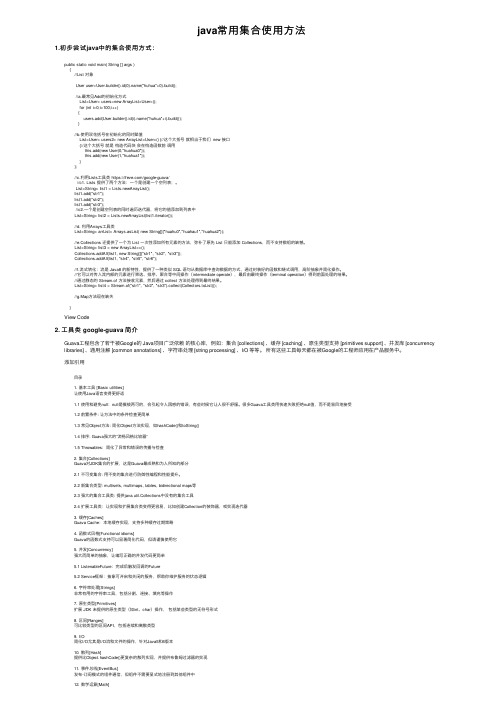
java常⽤集合使⽤⽅法1.初步尝试java中的集合使⽤⽅式:public static void main( String [] args ){//List 对象User user=User.builder().id(0).name("huhua"+0).build();//a.最常见Add的初始化⽅式List<User> users=new ArrayList<User>();for (int i=0;i<100;i++){users.add(User.builder().id(i).name("huhua"+i).build());}//b.使⽤双花括号在初始化的同时赋值List<User> users2= new ArrayList<User>() {//这个⼤括号就相当于我们 new 接⼝{//这个⼤括号就是构造代码块会在构造函数前调⽤this.add(new User(0,"huahua0"));this.add(new User(1,"huahua1"));}};//c.利⽤Lists⼯具类 https:///google-guava///c1. Lists 提供了两个⽅法:⼀个是创建⼀个空列表;。
List<String> list1 = Lists.newArrayList();list1.add("str1");list1.add("str2");list1.add("str3");//c2.⼀个是创建空列表的同时遍历迭代器,将它的值添加到列表中List<String> list2 = Lists.newArrayList(list1.iterator());//d. 利⽤Arrays⼯具类List<String> arrList= Arrays.asList( new String[]{"huahu0","huahau1","huahua2"});//e.Collections 还提供了⼀个为 List ⼀次性添加所有元素的⽅法,弥补了原先 List 只能添加 Collections,⽽不⽀持数组的缺憾。
集合面试题java
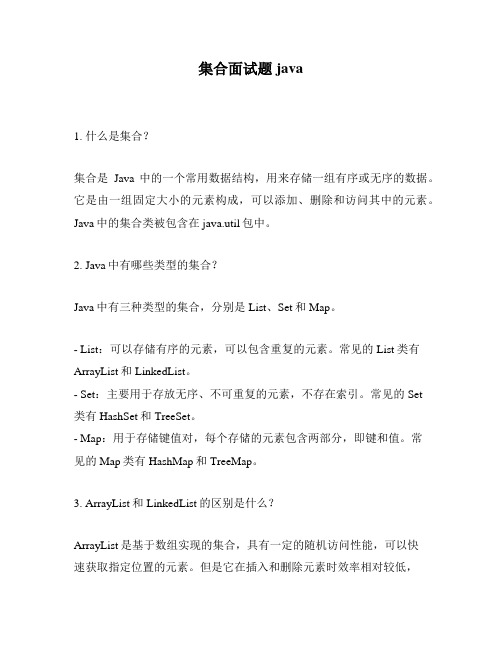
集合面试题java1. 什么是集合?集合是Java中的一个常用数据结构,用来存储一组有序或无序的数据。
它是由一组固定大小的元素构成,可以添加、删除和访问其中的元素。
Java中的集合类被包含在java.util包中。
2. Java中有哪些类型的集合?Java中有三种类型的集合,分别是List、Set和Map。
- List:可以存储有序的元素,可以包含重复的元素。
常见的List类有ArrayList和LinkedList。
- Set:主要用于存放无序、不可重复的元素,不存在索引。
常见的Set类有HashSet和TreeSet。
- Map:用于存储键值对,每个存储的元素包含两部分,即键和值。
常见的Map类有HashMap和TreeMap。
3. ArrayList和LinkedList的区别是什么?ArrayList是基于数组实现的集合,具有一定的随机访问性能,可以快速获取指定位置的元素。
但是它在插入和删除元素时效率相对较低,需要重新排列数组。
而LinkedList是基于链表实现的集合,插入和删除元素时速度比ArrayList要快,但是获取指定位置的元素需要遍历整个链表,效率相对较低。
4. HashSet和TreeSet的区别是什么?HashSet是基于哈希表实现的集合,不保证元素的顺序,具有快速的添加、删除和查找元素的能力。
但是它不支持对元素的有序遍历。
而TreeSet是基于红黑树实现的集合,对元素进行自然排序或者指定排序规则进行排序,可以通过迭代器对元素进行有序的遍历。
5. 什么是迭代器?迭代器是一种遍历集合元素的方式,用于逐个访问集合元素。
它是Java中的一个接口,包含常用的方法,如hasNext()和next()。
Iterator 接口是Java中访问集合元素的标准方式,可以访问所有实现了java.util.Collection接口的集合类。
6. 如何遍历一个集合?Java中提供了三种遍历集合的方式,分别是for-each循环、迭代器和Java 8中的Lambda表达式。
java中常用英文简写全拼与中文意思
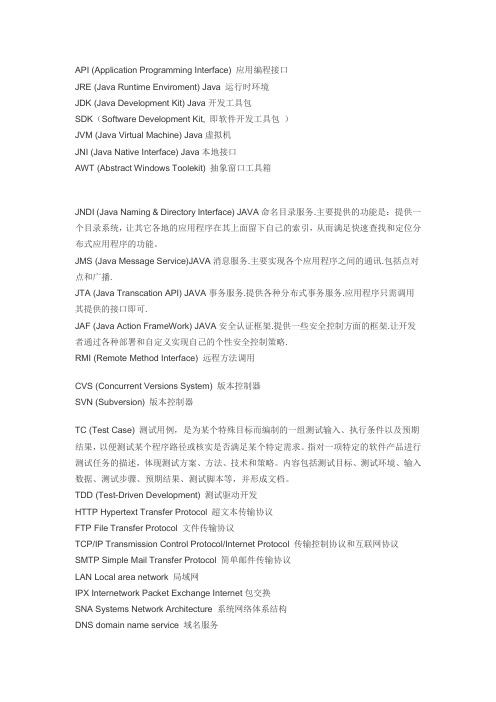
API (Application Programming Interface) 应用编程接口JRE (Java Runtime Enviroment) Java 运行时环境JDK (Java Development Kit) Java开发工具包SDK(Software Development Kit, 即软件开发工具包)JVM (Java Virtual Machine) Java虚拟机JNI (Java Native Interface) Java本地接口AWT (Abstract Windows Toolekit) 抽象窗口工具箱JNDI (Java Naming & Directory Interface) JAVA命名目录服务.主要提供的功能是:提供一个目录系统,让其它各地的应用程序在其上面留下自己的索引,从而满足快速查找和定位分布式应用程序的功能。
JMS (Java Message Service)JAVA消息服务.主要实现各个应用程序之间的通讯.包括点对点和广播.JTA (Java Transcation API) JAVA事务服务.提供各种分布式事务服务.应用程序只需调用其提供的接口即可.JAF (Java Action FrameWork) JAVA安全认证框架.提供一些安全控制方面的框架.让开发者通过各种部署和自定义实现自己的个性安全控制策略.RMI (Remote Method Interface) 远程方法调用CVS (Concurrent Versions System) 版本控制器SVN (Subversion) 版本控制器TC (Test Case) 测试用例,是为某个特殊目标而编制的一组测试输入、执行条件以及预期结果,以便测试某个程序路径或核实是否满足某个特定需求。
指对一项特定的软件产品进行测试任务的描述,体现测试方案、方法、技术和策略。
内容包括测试目标、测试环境、输入数据、测试步骤、预期结果、测试脚本等,并形成文档。
java 编程常用英语单词 解释
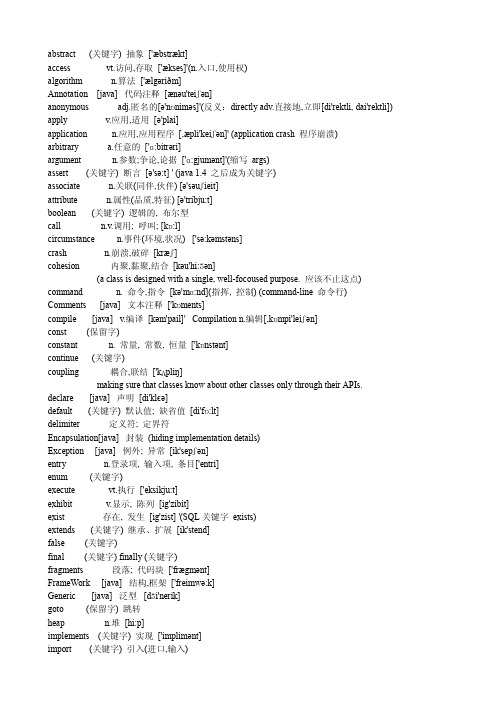
abstract (关键字) 抽象['æbstrækt]access vt.访问,存取['ækses]'(n.入口,使用权)algorithm n.算法['ælgәriðm]Annotation [java] 代码注释[ænәu'teiʃәn]anonymous adj.匿名的[ә'nɒnimәs]'(反义:directly adv.直接地,立即[di'rektli, dai'rektli]) apply v.应用,适用[ә'plai]application n.应用,应用程序[,æpli'keiʃәn]' (application crash 程序崩溃)arbitrary a.任意的['ɑ:bitrәri]argument n.参数;争论,论据['ɑ:gjumәnt]'(缩写args)assert (关键字) 断言[ә'sә:t] ' (java 1.4 之后成为关键字)associate n.关联(同伴,伙伴) [ә'sәuʃieit]attribute n.属性(品质,特征) [ә'tribju:t]boolean (关键字) 逻辑的, 布尔型call n.v.调用; 呼叫; [kɒ:l]circumstance n.事件(环境,状况) ['sә:kәmstәns]crash n.崩溃,破碎[kræʃ]cohesion 内聚,黏聚,结合[kәu'hi:ʒәn](a class is designed with a single, well-focoused purpose. 应该不止这点) command n. 命令,指令[kә'mɑ:nd](指挥, 控制) (command-line 命令行) Comments [java] 文本注释['kɒments]compile [java] v.编译[kәm'pail]' Compilation n.编辑[,kɒmpi'leiʃәn]const (保留字)constant n. 常量, 常数, 恒量['kɒnstәnt]continue (关键字)coupling 耦合,联结['kʌpliŋ]making sure that classes know about other classes only through their APIs. declare [java] 声明[di'klєә]default (关键字) 默认值; 缺省值[di'fɒ:lt]delimiter 定义符; 定界符Encapsulation[java] 封装(hiding implementation details)Exception [java] 例外; 异常[ik'sepʃәn]entry n.登录项, 输入项, 条目['entri]enum (关键字)execute vt.执行['eksikju:t]exhibit v.显示, 陈列[ig'zibit]exist 存在, 发生[ig'zist] '(SQL关键字exists)extends (关键字) 继承、扩展[ik'stend]false (关键字)final (关键字) finally (关键字)fragments 段落; 代码块['frægmәnt]FrameWork [java] 结构,框架['freimwә:k]Generic [java] 泛型[dʒi'nerik]goto (保留字) 跳转heap n.堆[hi:p]implements (关键字) 实现['implimәnt]import (关键字) 引入(进口,输入)Info n.信息(information [,infә'meiʃәn] )Inheritance [java] 继承[in'heritәns] (遗传,遗产)initialize 预置初始化[i'niʃәlaiz]instanceof (关键字) 运算符,用于引用变量,以检查这个对象是否是某种类型。
Java集合排序及java集合类详解(Collection、List、Map、Set)
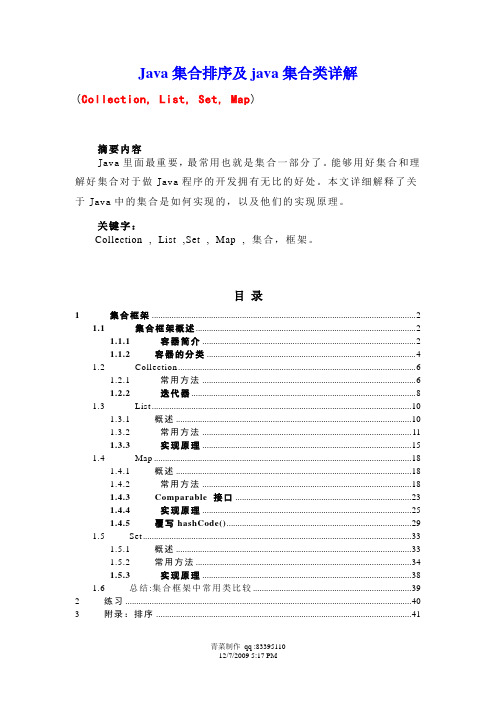
Java集合排序及java集合类详解(Collection, List, Set, Map)摘要内容Java里面最重要,最常用也就是集合一部分了。
能够用好集合和理解好集合对于做Java程序的开发拥有无比的好处。
本文详细解释了关于Java中的集合是如何实现的,以及他们的实现原理。
关键字:Collection , List ,Set , Map , 集合,框架。
目录1 集合框架 (2)1.1 集合框架概述 (2)1.1.1 容器简介 (2)1.1.2 容器的分类 (4)1.2 Collection (6)1.2.1 常用方法 (6)1.2.2 迭代器 (8)1.3 List (10)1.3.1 概述 (10)1.3.2 常用方法 (11)1.3.3 实现原理 (15)1.4 Map (18)1.4.1 概述 (18)1.4.2 常用方法 (18)1.4.3 Comparable 接口 (23)1.4.4 实现原理 (25)1.4.5 覆写hashCode() (29)1.5 Set (33)1.5.1 概述 (33)1.5.2 常用方法 (34)1.5.3 实现原理 (38)1.6 总结:集合框架中常用类比较 (39)2 练习 (40)3 附录:排序 (41)1集合框架1.1集合框架概述1.1.1容器简介到目前为止,我们已经学习了如何创建多个不同的对象,定义了这些对象以后,我们就可以利用它们来做一些有意义的事情。
举例来说,假设要存储许多雇员,不同的雇员的区别仅在于雇员的身份证号。
我们可以通过身份证号来顺序存储每个雇员,但是在内存中实现呢?是不是要准备足够的内存来存储1000个雇员,然后再将这些雇员逐一插入?如果已经插入了500条记录,这时需要插入一个身份证号较低的新雇员,该怎么办呢?是在内存中将500条记录全部下移后,再从开头插入新的记录? 还是创建一个映射来记住每个对象的位置?当决定如何存储对象的集合时,必须考虑如下问题。
java开发常用单词
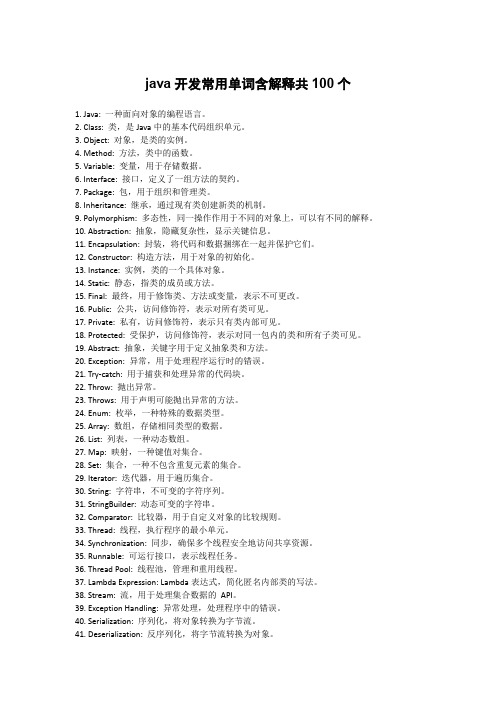
java开发常用单词含解释共100个1. Java: 一种面向对象的编程语言。
2. Class: 类,是Java中的基本代码组织单元。
3. Object: 对象,是类的实例。
4. Method: 方法,类中的函数。
5. Variable: 变量,用于存储数据。
6. Interface: 接口,定义了一组方法的契约。
7. Package: 包,用于组织和管理类。
8. Inheritance: 继承,通过现有类创建新类的机制。
9. Polymorphism: 多态性,同一操作作用于不同的对象上,可以有不同的解释。
10. Abstraction: 抽象,隐藏复杂性,显示关键信息。
11. Encapsulation: 封装,将代码和数据捆绑在一起并保护它们。
12. Constructor: 构造方法,用于对象的初始化。
13. Instance: 实例,类的一个具体对象。
14. Static: 静态,指类的成员或方法。
15. Final: 最终,用于修饰类、方法或变量,表示不可更改。
16. Public: 公共,访问修饰符,表示对所有类可见。
17. Private: 私有,访问修饰符,表示只有类内部可见。
18. Protected: 受保护,访问修饰符,表示对同一包内的类和所有子类可见。
19. Abstract: 抽象,关键字用于定义抽象类和方法。
20. Exception: 异常,用于处理程序运行时的错误。
21. Try-catch: 用于捕获和处理异常的代码块。
22. Throw: 抛出异常。
23. Throws: 用于声明可能抛出异常的方法。
24. Enum: 枚举,一种特殊的数据类型。
25. Array: 数组,存储相同类型的数据。
26. List: 列表,一种动态数组。
27. Map: 映射,一种键值对集合。
28. Set: 集合,一种不包含重复元素的集合。
29. Iterator: 迭代器,用于遍历集合。
Java词汇大全(非常有用)
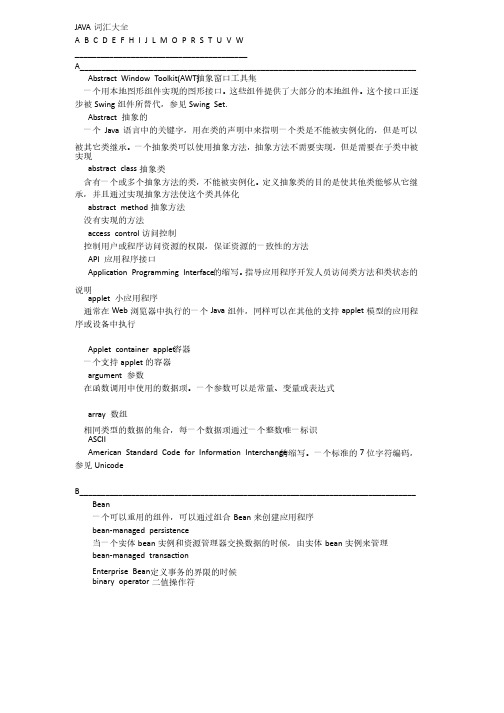
JAVA 词汇大全A B C D E F H I J L M O P R S T U V W ________________________________________ A______________________________________________________________________________ Abstract Window Toolkit(AWT)抽象窗口工具集抽象窗口工具集一个用本地图形组件实现的图形接口。
这些组件提供了大部分的本地组件。
这个接口正逐步被Swing 组件所替代,参见Swing Set. Abstract 抽象的一个Java 语言中的关键字,用在类的声明中来指明一个类是不能被实例化的,但是可以被其它类继承。
被其它类继承。
一个抽象类可以使用抽象方法,一个抽象类可以使用抽象方法,一个抽象类可以使用抽象方法,抽象方法不需要实现,抽象方法不需要实现,但是需要在子类中被实现abstract class 抽象类含有一个或多个抽象方法的类,不能被实例化。
定义抽象类的目的是使其他类能够从它继承,并且通过实现抽象方法使这个类具体化abstract method 抽象方法没有实现的方法access control 访问控制控制用户或程序访问资源的权限,保证资源的一致性的方法API 应用程序接口Applica on Programming Interface 的缩写。
指导应用程序开发人员访问类方法和类状态的说明applet 小应用程序通常在Web 浏览器中执行的一个Java 组件,同样可以在其他的支持applet 模型的应用程序或设备中执行Applet container applet 容器一个支持applet 的容器argument 参数在函数调用中使用的数据项。
一个参数可以是常量、变量或表达式array 数组相同类型的数据的集合,每一个数据项通过一个整数唯一标识ASCII American Standard Code for Informa on Interchange 的缩写。
介绍java英语作文

介绍java英语作文The Essence of Java: A Programming Paradigm.Java, a programming language that revolutionized the software industry, has become synonymous with reliability, portability, and scalability. Its journey from itsinception in 1991 to its widespread adoption today is a testament to its versatility and adaptability. In this article, we delve into the core characteristics of Javathat have made it a preferred choice for developers across the globe.Origins and Evolution.Java was born out of a necessity to create a programming language that was both powerful and easy to use. Its creators, James Gosling, Mike Sheridan, and Patrick Naughton, were motivated by the complexities of C++ and the need for a language that could run on various platforms seamlessly. The result was Java, a language that combinedthe power of C++ with the simplicity of Smalltalk.Over the years, Java has evolved significantly. Fromits initial version, Java 1.0, released in 1996, to the latest iteration, Java 17, released in 2021, the language has undergone numerous improvements and enhancements. These include the addition of new features like lambda expressions, streams, and modularization, among others.Core Characteristics of Java.1. Platform Independence: Java's "Write Once, Run Anywhere" mantra is its most prominent feature. This is achieved through the Java Virtual Machine (JVM), which acts as an interpreter and converts Java bytecodes into machine code executable by the underlying hardware. This ensures that Java programs can run seamlessly on any platform, provided it has the JVM installed.2. Object-Oriented Programming: Java is an object-oriented programming (OOP) language, emphasizing the use of objects and classes. This paradigm simplifies complexsystems by breaking them down into manageable components. Java supports all the fundamental OOP concepts, including encapsulation, inheritance, and polymorphism.3. Robustness and Security: Java's strong typing, exception handling, and garbage collection mechanisms contribute to its robustness. By automatically managing memory allocation and deallocation, Java reduces the risk of memory leaks and other memory-related issues. Additionally, Java's security features, such as access control and encryption, make it an ideal choice for developing secure applications.4. Portability: As mentioned earlier, Java's cross-platform compatibility is one of its key strengths. The JVM ensures that Java programs can be transported easily from one platform to another without any modifications. This portability not only simplifies deployment but also扩大了Java的市场影响力。
java集合知识点总结

java集合知识点总结Java集合是Java编程中的一个重要的部分,它的理解和使用对编程者来说是必不可少的。
它为开发者提供了一种更好地操作和管理数据的方法,大大提高了应用开发所需的效率。
本文将简要介绍Java 集合的相关概念与特性,并通过实例来更好地了解其中的知识点。
一、Java集合介绍Java集合(Collection)包括一组对象(Object),它们可以是基本类型、对象或数组,它们可以用来存储,操作和管理程序中的数据,充分体现了“面向对象”编程的抽象能力。
Java集合的特点有:(1)集合是一种容器,可以存放任何类型的对象,它是一种非常抽象的概念,可以把一堆数据项放入集合对象中;(2)集合可以自动管理里面存放的对象,提供了统一的接口来访问和修改集合中的对象,从而避免了繁琐的操作;(3)集合的每个元素都有一定的顺序,也就是说可以通过顺序来访问它们;(4)集合还可以通过索引来访问元素,而且允许程序在集合中搜索元素,这对于快速定位某个元素是非常有用的;(5)集合可以保持对象的顺序,新加入的对象总是会在特定的位置被存放,从而保证了集合中元素的顺序;(6)集合可以保持在一个容器中的唯一性,允许只有一个唯一的元素存在,因此可以用来实现不出现重复元素的数据结构。
二、Java集合类Java集合类提供了一系列容器来存储、操作和管理不同类型的数据。
基本上,Java提供的集合类可以分为两个基本类型:集合和映射。
集合:集合是用来存储元素的一种容器,它提供了一系列的方法,可以用来添加、移除和检索容器中的对象。
在Java中,拥有两个基本的集合类型:线性集合和非线性集合。
线性集合:线性集合是指那些元素之间存在有序关系的集合,元素在线性集合中可以通过索引来访问。
它主要包括List和Set,其中List是有序的集合,而Set则是无序的集合。
非线性集合:非线性集合是指元素之间没有有序关系的集合,它提供的操作更为灵活,可以通过指定的键来访问元素。
JAVA英文单词汇总2
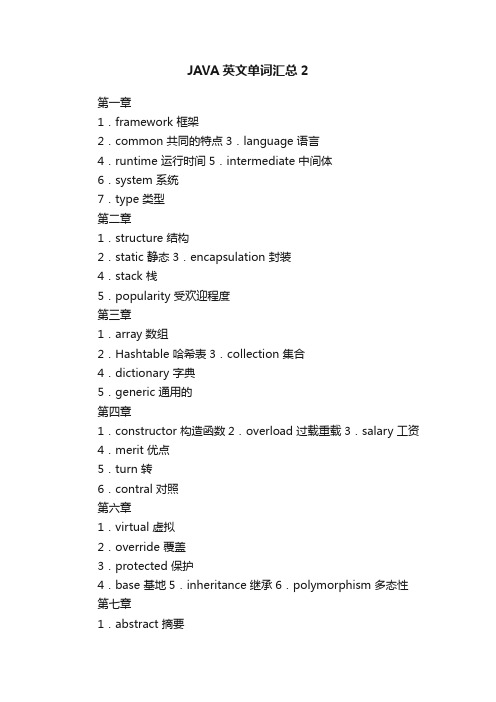
JAVA英文单词汇总2第一章1.framework 框架2.common 共同的特点3.language 语言4.runtime 运行时间5.intermediate 中间体6.system 系统7.type 类型第二章1.structure 结构2.static 静态3.encapsulation 封装4.stack 栈5.popularity 受欢迎程度第三章1.array 数组2.Hashtable 哈希表3.collection 集合4.dictionary 字典5.generic 通用的第四章1.constructor 构造函数2.overload 过载重载3.salary 工资4.merit 优点5.turn 转6.contral 对照第六章1.virtual 虚拟2.override 覆盖3.protected 保护4.base 基地5.inheritance 继承6.polymorphism 多态性第七章1.abstract 摘要2.substitution 替代3.principle 原则4.fly 飞5.speed 速度第八章1.design 设计2.pattern 模式3.factory 工厂4.singleton 单身5.pizza 比萨6.simple 简单7.unique 独一无二的第十章1.XML 可扩展标记语言2.channel 通道3.program 程序4.extensible 可扩展的5.markup 标记6.node 节点第十一章1.file 文件2.directory 目录3.stream 流4.encoding 编码5.exist 存在第十二章1.serialize 序列化2.attribute 属性3.binary 二进制4.save 节省5.obsolete 过时第十四章1.cinema 电影2.ticket 门票3.free 免费4.adventure 冒险5.cartoon 漫画第一章1.entity 实体2.relationship 关系3.diagram 图4.model 模型5.normal 正常6.formate 甲酸7.hotel 酒店8.guest 来宾9.promotion推广10.state 状态11.type 类型第二章1.create 创建2.drop 下降3.primary 初级4.exist 存在5.alter 修改6.growth 增长7.constraint 约束8.unique 独一无二的9.foreign 国外的有10.reference 参考第三章1.declare 声明2.variable 变量3.set 设置4.error 错误5.version 版本6.cast 演员7.convert 转换8.case 案例9.when 当10.then 然后11.average 平均第四章1.nest 巢2.simple 简单3.query 查询4.inner 内5.join 加入6.outer 外7.left 左9.alias 别名第六章1.transaction 交易2.automicity 原子性3.consistency 一致性4.isolation 隔离5.durability 持久性6.commit 承诺7.rollback 回滚8.view 查看9.index 指数第七章1.procedure 程序2.system 系统3.extensional 伸展4.define 定义5.execute 执行6.parameter 参数7.input 输入8.output 输出9.default 默认10.value 价值第九章1.automatic 自动2.teller 出纳3.machine 机4.deposit 保证金5.trade 贸易6.balance 平衡7.test 测试8.remark 备注第一章1.class 类2.object 对象3.static 静态4.final 不可更改5.private 私有6.public 公开7.protect 保护9.constructor 构造函数10.encapsulation 封装第二章1.inheritance 继承2.extend 扩展,继承3.super 父类4.override 覆盖5.constructor 构造函数6.public 公开7.abstract 抽象8.final 不可更改第三章1.polymorphism 多态2.instance 实例3.override 覆盖4.constructor 构造函数5.ClassCastException 类型转换异常6.upcasting 向上转型7.downcasting 向下转型8.abstract 抽象第四章1.interface 接口2.public 公开3.static 静态4.final 不可更改5.abstract 抽象6.implement 实现第五章1.time 时间2.limit 限制3.elapse 流逝4.level 级别5.parameter 参数6.static 静态7.code 代码8.block 块第八章1.exception 异常2.try 尝试3.catch 捕获4.finally 最后5.throw 抛出6.arithmetic 算法7.log 日志8.property 属性第九章1.collection 集合2.set 设置3.list 列表4.map 地图5.iterator 迭代器6.generic 泛型7.remove 删除8.contain 包含9.key 关键10.value 价值第十章1.JDBC 一种用于执行SQL语句的Java API(Java 数据库连接) 2.driver manager 驱动程序管理器3.connection 连接4.statement 声明5.execute 执行6.append 附加7.query 查询8.result set 结果集第十一章1.Oracle 甲骨文2.database 数据库3.grant 授权4.revoke 撤销5.constraint 约束6.column 列7.sequence 序列8.increment 增量9.cache 缓存第十二章1.extract 摘录2.decode 解码3.trim 修剪4.count 计数5.index 指数6.unique 独一无二的7.bitmap 位图8.import 导入9.export 出口第十三章1.data 数据2.access 访问3.object 对象4.entity 实体5.purchase 购买6.tax 税7.vehicle 车辆8.guide 指南9.invoice 发票第十四章1.XML XML(可扩展置标语言)2.XHTML XHTML(可扩展超文本置标语言)3.DTD DTD(文件类型描述)4.XSD xsd(可扩展标记语言范式描述) 5.XSL XSL(可扩展样式语言)6.CSS CSS(层叠样式表)7.DOM DOM(文档对象模型)8.SAX SAX(可扩展标记语言简易应用程序接口)第十五章1.balance 平衡2.account 帐户3.deal 交易4.breed 品种5.entity 实体6.factory 工厂7.charge 负责8.stock 股票,库存第一章1.BOM 浏览器对象模型2.DOM 文档对象模型3.document 文件4.undefined 未定义5.object 对象6.alert 警报,提示7.prompt 提示8.break 中断9.continue 继续第二章1.confirm 确认2.open 打开3.close 关闭4.function 功能,函数5.date 日期6.interval 间隔7.timeout 超时8.onload 载入时第三章1.display 显示2.visibility 可见性3.visible 可见4.block 块5.write 写6.hidden 隐藏7.forward 转向8.back 退后9.reload 重新加载第四章1.core 核心2.attribute 属性3.append 附加4.node 节点5.remove 删除6.replace 替换7.insert 插入8.delete 删除9.row 行第五章1.style 风格2.className 类名3.top 顶部4.left 左6.current 当前的7.compute 计算8.mouse 鼠标9.over 以上第六章1.String 字符串2.length 长度3.LowerCase 小写4.UpperCase 大写5.index 指数6.focus 焦点7.select 选择8.blur 失去焦点第七章1.regular 正则2.express 表达式3.test 测试4.match 匹配5.split 分割6.global 全球,全局7.select 选择8.option 选项9.join 加入,联结10.sort 排序第十章1.collection 集合2.validate 验证3.array 数组4.product 产品5.count 计数6.remove 删除第一章1.hypertext 超文本2.transfer 传输3.protocol 协议4.uniform 统一5.resource 资源6.browser 浏览器8.client 客户端9.deploy 部署10.undeploy 取消部署第二章1.comment 评论2.charset 字符集3.import 导入4.declaration 声明5.language 语言6.implicit 隐式7.request 要求,请求8.content 内容第三章1.response 回应2.redirect 重定向3.content 内容4.message 消息5.document 文件6.validate 验证7.character 特征,字符第四章1.cookie 饼干2.session 会话3.include 包括4.application 应用程序5.attribute 属性6.interval 间隔7.inactive 无效,失效第五章1.directory 目录2.interface 接口3.context 上下文4.environment 环境5.pool 池6.bean 豆7.JNDI Java命名和目录接口8.DataSource 数据源第六章1.mail 邮箱2.count 计数3.size 大小4.total 总计5.current 当前的6.index 指数7.display 显示8.upload 上传第七章1.model 模型2.tier 级,层3.business 业务4.DAO 数据访问对象5.abstract 抽象6.extend 继承7.interface 接口8.implement 实现第八章1.expression 表达式2.standard 标准3.prefix 前缀4.library 库5.scope 范围6.tag 标签第九章1.message 消息2.select 选择3.size 大小4.order 订购,订单5.top 顶部6.container 容器7.context 上下文8.redirect 重定向第十章1.initialize 初始化2.pattern 模式3.exception 异常4.generic 泛型5.config 配置6.context 上下文7.destroy 摧毁,销毁8.service 服务第十二章1.asynchronous 异步2.synchronous 同步3.exist 存在4.validate 验证5.login 登录6.check 检查7.document 文件8.element 元素第十三章1.stock 股票,库存2.cart 车3.item 项目4.order 订购5.legal 合法的6.current 当前的7.dispatcher 调度员8.keywords 关键词。
java集合总结
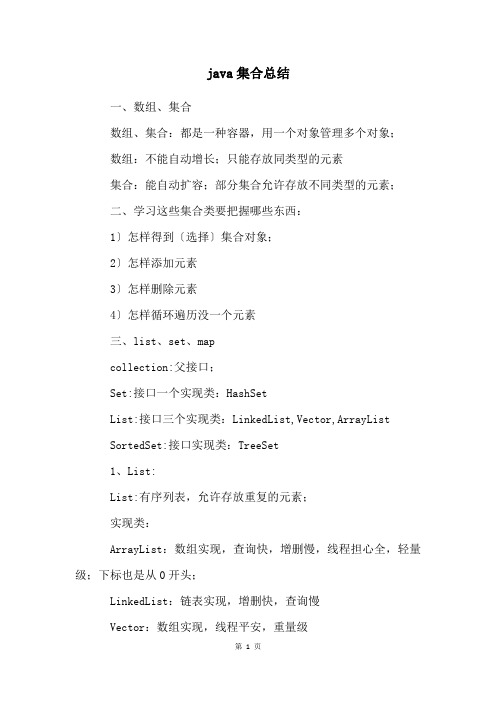
java集合总结一、数组、集合数组、集合:都是一种容器,用一个对象管理多个对象;数组:不能自动增长;只能存放同类型的元素集合:能自动扩容;部分集合允许存放不同类型的元素;二、学习这些集合类要把握哪些东西:1〕怎样得到〔选择〕集合对象;2〕怎样添加元素3〕怎样删除元素4〕怎样循环遍历没一个元素三、list、set、mapcollection:父接口;Set:接口一个实现类:HashSetList:接口三个实现类:LinkedList,Vector,ArrayListSortedSet:接口实现类:TreeSet1、List:List:有序列表,允许存放重复的元素;实现类:ArrayList:数组实现,查询快,增删慢,线程担心全,轻量级;下标也是从0开头;LinkedList:链表实现,增删快,查询慢Vector:数组实现,线程平安,重量级2.Set:无序集合,不允许存放重复的元素;实现类HashSet:equals返回true,hashCode返回相同的整数;哈希表;子接口SortedSet:对Set排序实现类:TreeSet:二叉树实现的;看API:E泛型:表示一个对象;Iterator:接口,迭代器;java.util;hasNext();next();remove();Iterable:可迭代的,访问的;ng;实现了可迭代的接口就可以用迭代的方式访问;只需实现iterator();方法即可;Iteratoriterator();三种循环的访问方式:只有实现了Iterable接口的才能用第三种;能用其次种的也肯定能用第三种;ArrayList:自动扩容,是数组照搬过来的;3.MapHashMap:键值对,key不能重复,但是value可以重复;key 的实现就是HashSet;value对应着放;HashSet的后台有一个HashMap;初始化后台容量;只不过生成一个HashSet的话,系统只供应key的访问;假如有两个Key重复,那么会掩盖之前的;Hashtable:线程平安的Properties:java.util.Properties;key和value都是String 类型,用来读配置文件;HashMap与Hashtable区分:HashMap线程担心全的,允许null作为key或value;Hashtable线程平安的,不允许null作为key或value;TreeMap:对key排好序的Map;key就是TreeSet,value对应每个key;key要实现Comparable接口或TreeMap有自己的构造器;HashSet:remove(Objecto)的原则看这个对象O的Hashcode和equals是否相等,并不是看是不是一个对象;定义一个Map;key是课程名称,value是Integer表示选课人数;map.put(cou,map.get(cou)+newInteger(1));四、Hashtable、Properties1,Hashtable:实现了Map接口,此类实现一个哈希表,作用和HashMap相同。
JAVA中常见的英文单词(5篇模版)

JAVA中常见的英文单词(5篇模版)第一篇:JAVA中常见的英文单词1.修饰类的修饰符:public[公共的]default[默认的]final [最后的]abstract[抽象的]特别注意:final或者abstract在修饰类的时候必须放在public或者default的后边2.修饰方法和变量的修饰符:public[公共的]static[静态的]protected[受保护的] final[最后的] default[默认的]private[私有的]特别注意:static或者final在修饰变量或方法的时候,只能放在public, protected, default, private 的后边。
3.基本的数据类型:1).整数类型:byteshortintlong2).浮点类型:floatdouble3).字符型:char4).布尔类型:boolean布尔类型的值:true [真]false[假]4.方法的返回类型:void:方法没有返回值。
非void:方法有返回值。
必须有一条return语句。
而且return语句是方法中最后一条语句。
5.每个类的对象都默认有下列两个方法:1).系统在垃圾回收之前自动调用的方法:finalize()2).将对象转换成字符串toString()6.对象运算符:[判断此对象是不是该类的实例]instanceof7.语句:1).打印输出语句:[程序测试语句]System.out.println();2).分支语句:if(条件部分){}if(条件部分){}else{}if(条件部分){ }else if(条件部分){}else{}switch(需要判断的变量){case 变量值1:若干个语句;break;case 变量值2:若干个语句;break;…… default:若干个语句; }特别注意:switch语句中各个分支添加break语句和不添加break语句的区别。
switch语句中需要判断的变量变型只能是:byte, short , int , char 这四种类型。
Java—集合框架List和Set的contains()以及Map的containsKey。。。
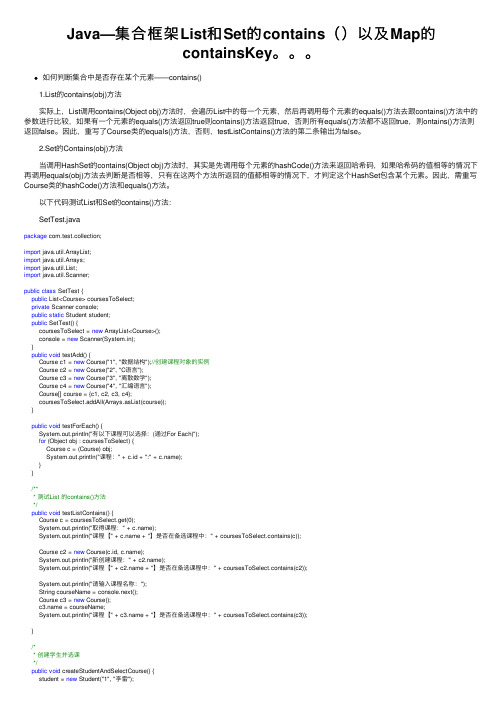
Java—集合框架List和Set的contains()以及Map的containsKey。
如何判断集合中是否存在某个元素——contains() 1.List的contains(obj)⽅法 实际上,List调⽤contains(Object obj)⽅法时,会遍历List中的每⼀个元素,然后再调⽤每个元素的equals()⽅法去跟contains()⽅法中的参数进⾏⽐较,如果有⼀个元素的equals()⽅法返回true则contains()⽅法返回true,否则所有equals()⽅法都不返回true,则ontains()⽅法则返回false。
因此,重写了Course类的equals()⽅法,否则,testListContains()⽅法的第⼆条输出为false。
2.Set的Contains(obj)⽅法 当调⽤HashSet的contains(Object obj)⽅法时,其实是先调⽤每个元素的hashCode()⽅法来返回哈希码,如果哈希码的值相等的情况下再调⽤equals(obj)⽅法去判断是否相等,只有在这两个⽅法所返回的值都相等的情况下,才判定这个HashSet包含某个元素。
因此,需重写Course类的hashCode()⽅法和equals()⽅法。
以下代码测试List和Set的contains()⽅法: SetTest.javapackage com.test.collection;import java.util.ArrayList;import java.util.Arrays;import java.util.List;import java.util.Scanner;public class SetTest {public List<Course> coursesToSelect;private Scanner console;public static Student student;public SetTest() {coursesToSelect = new ArrayList<Course>();console = new Scanner(System.in);}public void testAdd() {Course c1 = new Course("1", "数据结构");//创建课程对象的实例Course c2 = new Course("2", "C语⾔");Course c3 = new Course("3", "离散数学");Course c4 = new Course("4", "汇编语⾔");Course[] course = {c1, c2, c3, c4};coursesToSelect.addAll(Arrays.asList(course));}public void testForEach() {System.out.println("有以下课程可以选择:(通过For Each)");for (Object obj : coursesToSelect) {Course c = (Course) obj;System.out.println("课程:" + c.id + ":" + );}}/*** 测试List 的contains()⽅法*/public void testListContains() {Course c = coursesToSelect.get(0);System.out.println("取得课程:" + );System.out.println("课程【" + + "】是否在备选课程中:" + coursesToSelect.contains(c));Course c2 = new Course(c.id, );System.out.println("新创建课程:" + );System.out.println("课程【" + + "】是否在备选课程中:" + coursesToSelect.contains(c2));System.out.println("请输⼊课程名称:");String courseName = console.next();Course c3 = new Course(); = courseName;System.out.println("课程【" + + "】是否在备选课程中:" + coursesToSelect.contains(c3));}/** 创建学⽣并选课*/public void createStudentAndSelectCourse() {student = new Student("1", "李雷");for (int i = 0; i < 3; i++) {System.out.println("请输⼊课程编号:");String courseId = console.next();for(Course c : coursesToSelect ) {if (c.id.equals(courseId)) {student.courses.add(c);}}}}public void testForEachForSet(Student student) {System.out.println("共选择了" + student.courses.size() + "门课程!");for (Course c : student.courses) {System.out.println("选择了课程:" + c.id + ":" + );}}/*** 测试Set的contains()⽅法*/public void testSetContains() {System.out.println("请输⼊课程名称:");String courseName = console.next();Course c = new Course(); = courseName;System.out.println("所选择的课程中是否包含" + courseName + ":" + student.courses.contains(c)); }public static void main(String[] args) {SetTest st = new SetTest();st.testAdd();st.testListContains();st.createStudentAndSelectCourse();st.testForEachForSet(SetTest.student);st.testSetContains();}} Course类:package com.test.collection;/*** 课程类* @author Administrator**/public class Course {public String id;public String name;public Course(String id, String name){this.id = id; = name;}public Course() {}@Overridepublic int hashCode() {final int prime = 31;int result = 1;result = prime * result + ((name == null) ? 0 : name.hashCode());return result;}@Overridepublic boolean equals(Object obj) {if (this == obj)return true;if (obj == null)return false;if (!(obj instanceof Course))return false;Course other = (Course) obj;if (name == null) {if ( != null)return false;} else if (!name.equals())return false;return true;}}Map中是否包含指定的Key和Value 在Map中,⽤containsKey()⽅法,判断是否包含某个Key值;⽤containsValue()⽅法,判断是否包含某个Value值。
JAVA编程术语英语翻译

**********************<JAVA编程术语英语翻译>**********************abstract 抽象的抽象的abstraction 抽象体、抽象物、抽象性抽象体、抽象物、抽象性access 存取、取用存取、访问access level 存取级别访问级别access function 存取函式访问函数activate 活化激活active 作用中的adapter 配接器适配器address 位址地址address space 位址空间,定址空间address-of operator 取址运算子取地址操作符aggregation 聚合algorithm 演算法算法allocate 配置分配allocator (空间)配置器分配器application 应用程式应用、应用程序application framework 应用程式框架、应用框架应用程序框架architecture 架构、系统架构体系结构argument 引数(传给函式的值)。
叁见 parameter 叁数、实质叁数、实叁、自变量array 阵列数组arrow operator arrow(箭头)运算子箭头操作符assembly 装配件assembly language 组合语言汇编语言assert(ion) 断言assign 指派、指定、设值、赋值赋值assignment 指派、指定赋值、分配assignment operator 指派(赋值)运算子 = 赋值操作符associated 相应的、相关的相关的、关联、相应的associative container 关联式容器(对应sequential container)关联式容器atomic 不可分割的原子的attribute 属性属性、特性audio 音讯音频A.I. 人工智慧人工智能background 背景背景(用於图形着色)後台(用於行程)backward compatible 回溯相容向下兼容bandwidth 频宽带宽base class 基础类别基类base type 基础型别 (等同於 base class)batch 批次(意思是整批作业)批处理benefit 利益收益best viable function 最佳可行函式最佳可行函式(从 viable functions 中挑出的最佳吻合者)binary search 二分搜寻法二分查找binary tree 二元树二叉树binary function 二元函式双叁函数binary operator 二元运算子二元操作符binding 系结绑定bit 位元位bit field 位元栏位域bitmap 位元图位图bitwise 以 bit 为单元逐一┅bitwise copy 以 bit 为单元进行复制;位元逐一复制位拷贝block 区块,区段块、区块、语句块boolean 布林值(真假值,true 或 false)布尔值border 边框、框线边框brace(curly brace) 大括弧、大括号花括弧、花括号bracket(square brakcet) 中括弧、中括号方括弧、方括号breakpoint 中断点断点build 建造、构筑、建置(MS 用语)build-in 内建内置bus 汇流排总线business 商务,业务业务buttons 按钮按钮byte 位元组(由 8 bits 组成)字节cache 快取高速缓存call 呼叫、叫用调用callback 回呼回调call operator call(函式呼叫)运算子调用操作符(同 function call operator)candidate function 候选函式候选函数(在函式多载决议程序中出现的候选函式)chain 串链(例 chain of function calls)链character 字元字符check box 核取方块 (i.e. check button) 复选框checked exception 可控式异常(Java)check button 方钮 (i.e. check box) 复选按钮child class 子类别(或称为derived class, subtype)子类class 类别类class body 类别本体类体class declaration 类别宣告、类别宣告式类声明class definition 类别定义、类别定义式类定义class derivation list 类别衍化列类继承列表class head 类别表头类头class hierarchy 类别继承体系, 类别阶层类层次体系class library 类别程式库、类别库类库class template 类别模板、类别范本类模板class template partial specializations类别模板偏特化类模板部分特化class template specializations类别模板特化类模板特化cleanup 清理、善後清理、清除client 客端、客户端、客户客户client-server 主从架构客户/服务器clipboard 剪贴簿剪贴板clone 复制克隆collection 群集集合combo box 复合方块、复合框组合框command line 命令列命令行(系统文字模式下的整行执行命令)communication 通讯通讯compatible 相容兼容compile time 编译期编译期、编译时compiler 编译器编译器component 组件组件composition 复合、合成、组合组合computer 电脑、计算机计算机、电脑concept 概念概念concrete 具象的实在的concurrent 并行并发configuration 组态配置connection 连接,连线(网络,资料库)连接constraint 约束(条件)construct 构件构件container 容器容器(存放资料的某种结构如 list, vector...)containment 内含包容context 背景关系、周遭环境、上下脉络环境、上下文control 控制元件、控件控件console 主控台控制台const 常数(constant 的缩写,C++ 关键字)constant 常数(相对於 variable)常量constructor(ctor)建构式构造函数(与class 同名的一种 member functions)copy (v) 复制、拷贝拷贝copy (n) 复件, 副本cover 涵盖覆盖create 创建、建立、产生、生成创建creation 产生、生成创建cursor 游标光标custom 订制、自定定制data 资料数据database 资料库数据库database schema 数据库结构纲目data member 资料成员、成员变数数据成员、成员变量data structure 资料结构数据结构datagram 资料元数据报文dead lock 死结死锁debug 除错调试debugger 除错器调试器declaration 宣告、宣告式声明deduction 推导(例:template argument deduction)推导、推断default 预设缺省、默认defer 延缓推迟define 定义预定义definition 定义、定义区、定义式定义delegate 委派、委托、委任委托delegation (同上)demarshal 反编列散集dereference 提领(取出指标所指物体的内容)解叁考dereference operator dereference(提领)运算子 * 解叁考操作符derived class 衍生类别派生类design by contract 契约式设计design pattern 设计范式、设计样式设计模式※最近我比较喜欢「设计范式」一词destroy 摧毁、销毁destructor 解构式析构函数device 装置、设备设备dialog 对话窗、对话盒对话框directive 指令(例:using directive) (编译)指示符directory 目录目录disk 碟盘dispatch 分派分派distributed computing 分布式计算 (分布式电算) 分布式计算分散式计算 (分散式电算)document 文件文档dot operator dot(句点)运算子 . (圆)点操作符driver 驱动程式驱动(程序)dynamic binding 动态系结动态绑定efficiency 效率效率efficient 高效高效end user 终端用户entity 物体实体、物体encapsulation 封装封装enclosing class 外围类别(与巢状类别 nested class 有关)外围类enum (enumeration) 列举(一种 C++ 资料型别)枚举enumerators 列举元(enum 型别中的成员)枚举成员、枚举器equal 相等相等equality 相等性相等性equality operator equality(等号)运算子 == 等号操作符equivalence 等价性、等同性、对等性等价性equivalent 等价、等同、对等等价escape code 转义码转义码evaluate 评估、求值、核定评估event 事件事件event driven 事件驱动的事件驱动的exception 异常情况异常exception declaration 异常宣告(ref. C++ Primer 3/e, 11.3)异常声明exception handling 异常处理、异常处理机制异常处理、异常处理机制exception specification 异常规格(ref. C++ Primer 3/e, 11.4)异常规范exit 退离(指离开函式时的那一个执行点)退出explicit 明白的、明显的、显式显式export 汇出引出、导出expression 运算式、算式表达式facility 设施、设备设施、设备feature 特性field 栏位,资料栏(Java)字段, 值域(Java)file 档案文件firmware 韧体固件flag 旗标标记flash memory 快闪记忆体闪存flexibility 弹性灵活性flush 清理、扫清刷新font 字型字体form 表单(programming 用语)窗体formal parameter 形式叁数形式叁数forward declaration 前置宣告前置声明forwarding 转呼叫,转发转发forwarding function 转呼叫函式,转发函式转发函数fractal 碎形分形framework 框架框架full specialization 全特化(ref. partial specialization)function 函式、函数函数function call operator 同 call operatorfunction object 函式物件(ref. C++ Primer 3/e, 12.3)函数对象function overloaded resolution函式多载决议程序函数重载解决(方案)functionality 功能、机能功能function template 函式模板、函式范本函数模板functor 仿函式仿函式、函子game 游戏游戏generate 生成generic 泛型、一般化的一般化的、通用的、泛化generic algorithm 泛型演算法通用算法getter (相对於 setter) 取值函式global 全域的(对应於 local)全局的global object 全域物件全局对象global scope resolution operator全域生存空间(范围决议)运算子 :: 全局范围解析操作符group 群组group box 群组方块分组框guard clause 卫述句 (Refactoring, p250) 卫语句GUI 图形介面图形界面hand shaking 握手协商handle 识别码、识别号、号码牌、权柄句柄handler 处理常式处理函数hard-coded 编死的硬编码的hard-copy 硬拷图屏幕截图hard disk 硬碟硬盘hardware 硬体硬件hash table 杂凑表哈希表、散列表header file 表头档、标头档头文件heap 堆积堆hierarchy 阶层体系层次结构(体系)hook 挂钩钩子hyperlink 超链结超链接icon 图示、图标图标IDE 整合开发环境集成开发环境identifier 识别字、识别符号标识符if and only if 若且唯若当且仅当Illinois 伊利诺伊利诺斯image 影像图象immediate base 直接的(紧临的)上层 base class。
- 1、下载文档前请自行甄别文档内容的完整性,平台不提供额外的编辑、内容补充、找答案等附加服务。
- 2、"仅部分预览"的文档,不可在线预览部分如存在完整性等问题,可反馈申请退款(可完整预览的文档不适用该条件!)。
- 3、如文档侵犯您的权益,请联系客服反馈,我们会尽快为您处理(人工客服工作时间:9:00-18:30)。
6
Agenda
• Collections Overview • Generics • Vector, ArrayList, HashMap • Utils • Special Collections • Exercise
Generics
Generics are a way to define which types are allowed in your class or function
2
Agenda
• Collections Overview • Generics • Vector, ArrayList, HashMap • Utils • Special Collections • Exercise
Collections Overview
Collection classes in Java are containers of Objects which by polymorphism can hold any class that derives from Object (which is actually, any class) Using Generics the Collection classes can be aware of the types they store
10
Generics – for advanced students
Generics is a complex topic to cover it we added some more slides as an appendix
5
Collections Overview
2nd Example – now with Generics:
static public void main(String[] args) { ArrayList<String> argsList = new ArrayList<String>(); for(String str : args) { argsList.add(str); // argsList.add(7) would fail } if(argsList.contains("Koko") { System.out.println("We have Koko"); } String first = argsList.get(0); // no casting! System.out.println("First: " + first); }
Java Collections
Written by Amir Kirsh
© Amir Kves
By the end of this lesson you will:
• Be familiar with the Java collections • Understand the idea of Java Generics • Be able to implement sophisticated applications using different Java collections
public interface Map<K,V> { V put(K key, V value); }
9
Generics
Example 2 – Defining (our own) Generic Types:
public class GenericClass<T> { private T obj; public void setObj(T t) {obj = t;} public T getObj() {return obj;} public void print() { System.out.println(obj); } } Main: GenericClass<Integer> g = new GenericClass<Integer>(); g.setObj(5); // auto-boxing int i = g.getObj(); // auto-unboxing g.print();
4
Collections Overview
1st Example:
static public void main(String[] args) { ArrayList argsList = new ArrayList(); for(String str : args) { argsList.add(str); } if(argsList.contains("Koko") { System.out.println("We have Koko"); } String first = (String)argsList.get(0); System.out.println("First: " + first); }
// old way List myIntList1 = new LinkedList(); // 1 myIntList1.add(new Integer(0)); // 2 Integer x1 = (Integer) myIntList1.iterator().next(); // 3 // with generics List<Integer> myIntList2 = new LinkedList<Integer>(); // 1’ myIntList2.add(new Integer(0)); // 2’ Integer x2 = myIntList2.iterator().next(); // 3’
Can put here just 0, using autoboxing
8
Generics
Example 1 – Defining Generic Types:
public interface List<E> { void add(E x); Iterator<E> iterator(); }
public interface Iterator<E> { E next(); boolean hasNext(); }
